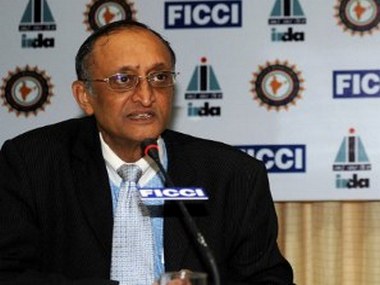Aiming towards a smooth roll out of Goods and Services Tax (GST) from 1 July, the GST Council will look into the three GST laws in its next
meeting, scheduled for 18 February.
The session by the Secretaries Panel at CNBC-TV 18 Mint’s ‘Budget 2017: The Verdict’ programme in New Delhi on Thursday evening discussed in detail the GST and its power to arrest, disinvestment plans, mergers and acquisitions, proposals for a new financial year, and other factors.
“Industry is looking forward to the laws and rules. Once they are finalised by the GST council, it will pave the way towards the implementation of GST from 1 July. The agenda of the next meeting is to look into all the three laws. In the subsequent meetings, we’ll take up the rules. As far as rates are concerned, it’s going to be a simplistic formula. The council has said that there would be four slabs: 5 percent, 12 percent, 18 percent and 28 percent,” said revenue secretary Hasmukh Adhia.
After the announcement of the Budget on 1 February, West Bengal finance minister Amit Mitra, who also heads the empowerment panel on GST, sent 16 demands to the Finance Ministry to look into, including the arrest clause, which was described as “draconian” by the West Bengal government.
“The power to arrest tax defaulters is already there under excise and service tax laws, and also under VAT in some states. After an extensive debate, a majority in the GST Council decided that no arrests should be made in cases of tax evasion up to Rs 2 crore. However, evaders between Rs 2 and Rs 5 crore could face bailable arrest. Above tax evasion of above Rs 5 crore, it may invite non-bailable arrest,” he said.
Is there a new financial year on cards?
Economic affairs secretary Shaktikant Das said, “The report to change the financial year is under consideration by the government. We are examining it, and once the decision is taken, it will be communicated.”
On IDBI Bank’s disinvestment plan
The government announced in the Budget that it hopes to raise Rs 72,500 crore in FY18 by divesting stakes in public sector firms. Compared to the revised estimate of Rs 45,500 crore for FY17, this is an increase of around 60 percent.
 While discussing the disinvestment plan of the state-run IDBI Bank, Das said, “The divestment of IDBI Bank is not off the table. The work is in progress. Its share value in the market doesn’t reflect the real estate it holds in Mumbai. The real estate valuation needs to be done carefully and a transparent decision needs to be taken in this case.”
While discussing the disinvestment plan of the state-run IDBI Bank, Das said, “The divestment of IDBI Bank is not off the table. The work is in progress. Its share value in the market doesn’t reflect the real estate it holds in Mumbai. The real estate valuation needs to be done carefully and a transparent decision needs to be taken in this case.”
“We’ve not derailed from the path of financial prudence. Today, our economy needs investment in certain sectors. As per the NK Singh panel, our fiscal deficit target is 3 percent and we’ll improve it in 2017-18,” Das added.
Priorities in 2017:
“To ensure people pay tax and society becomes more tax compliant”: Ashok Lavasa, finance secretary.
“Budget 2017 is very strong on reforms, and our focus is on implementation”: Shaktikant Das, economic affairs secretary.
“Roll out of GST from 1 July. 2017 will be the Year of GST”: Hasmukh Adhia, revenue secretary.
“Look for a stable and buoyant market”: Neeraj Gupta, secretary, department of investment and public asset management.
Source From : firstpost.com



